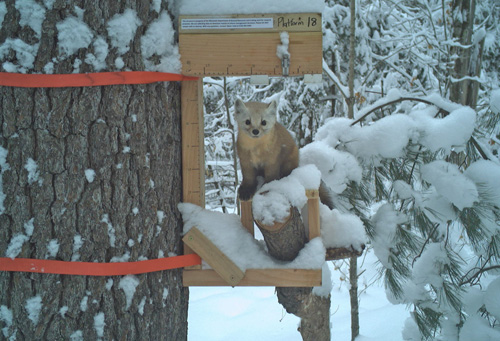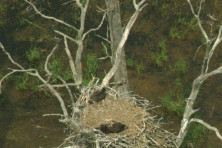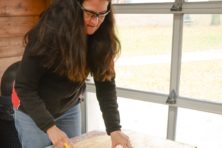Working to Restore Wisconsin’s American Marten Population
- Share
- Tweet
- Pin
- Share

Wisconsin conservation biologists hope a network of trail cameras can help to restore populations of the American marten, an elusive member of the weasel family and the only state endangered mammal in Wisconsin.
Starting in December 2018, biologists began deploying trail cameras among 120 sites in the Chequamegon-Nicolet National Forest to capture photos of the martens, which inhabit older forests of northern Wisconsin. A special platform mounted on a tree in front of a camera encourages a marten to reach for bait, clearly exposing for the camera the unique pattern of yellowish-orange fur on its throat and chest.
Biologists hope to use the resulting photos and data to track individual martens so they can generate more reliable estimates of population size and annual survival. As well, biologists hope the trail cameras can reveal more about the American marten’s habits so the Wisconsin Department of Natural Resources (DNR) and other conservation partners can refine strategies for recovering the species.
American martens were abundant and widely distributed in northern Wisconsin before European settlement. Unregulated trapping and widespread habitat destruction led to their disappearance from the state around 1925, and the mammal was placed on the state’s endangered-species list in 1972. Multiple attempts to reintroduce American martens in Wisconsin since the 1950s have had varying degrees of success.
“American martens are an important species in Wisconsin because they are known as an ‘umbrella species,’” said DNR conservation biologist Carly Lapin. “Managing Wisconsin forests to improve habitat for American martens will also improve habitat for a wide variety of other species that also rely upon older forests.”
The work of the DNR’s Bureau of Natural Heritage Conservation to restore endangered wildlife, plants and habitats and keep native species from disappearing is funded in part by the Endangered Resources Fund. People can donate to the fund on their Wisconsin income-tax form. The state matches all donations, doubling donors’ impact.


